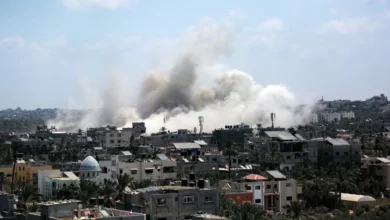In recent weeks Egyptian media has been involved in two crises. Some segments of the media handled the crises superficially while others were sincere. Much of the media expressed considerable tension during these crises, either genuine or artificial. But their manner of expressing themselves essentially contradicted genuine feelings of love and the desire to preserve national unity.
Campaigns were launched that I won’t describe. Suffice to say that these campaigns didn’t suit Egypt’s history and leadership position, and they also jeapordized Egyptian interests.Though I am convinced of what I say, I stand open to criticism.
The first of these crises was the Egypt-Algeria football match, which turned into a tragedy in which most media were involved. I had a chance to express my opinion, which was, of course, different from that of people who were having a quiet dinner at a Lebanese restaurant in Khartoum the same night the rioting took place, the very same people who screamed for help on satellite channels saying they were besieged and in danger. I said I condemned the acts of the Algerian spectators and the tone of some of the Algerian media. But Algeria’s media does not concern me as much as Egypt’s.
I said I denounced all the acts that harmed Egyptians and their interests in Sudan and Algeria, and I called for punishing the perpetrators. But, unlike others, I didn’t allow myself to slide into insulting Arabs and Arabism and disowning it, and proposing Pharaonism as an alternative. There are still some rational people among us, though they tend to be less vocal because of attempts to terrify them or label them as traitors.
President Mubarak’s words, which were both angry and rational, called for rectifying the situation, in a way that secures each side’s rights, while at the same time allowing the anger to subside. Mubarak refused to turn his back on historical and geographic ties, allowing a mere football match to determine the future of the strong relationship that binds two nations.
The second crisis is the one related to the nomination of Mohamed ElBaradei for the presidency. I would like to say the following:
1) ElBaradei is an old colleague known to be a great thinker, a successful diplomat, and an acknowledged legal expert. But I agree with a number of his colleagues that he still lacks some features needed by a politician who is supposed to work to obtain the votes of the people, without making them feel that he looks down on them. That was particularly my opinion after I watched a re-run of Ahmed el-Moslemany’s program el-Tabaa el-Oula (First Edition) featuring ElBaradei in 2008.
2) The statement issued by ElBaradei implied that he wanted some kind of public consensus over him as potential presdient even before running. It sounded as though he wanted to win the election before competing for it. He also presented demands, most of which can be satisfied, but not at the present time. That explains why some analysts saw his statement as a kind of veiled decline to run.
3) There is no justification whatsoever for the ridiculous campaign that was mounted as soon as ElBaradei issued his statement, which seemed like a wild attempt to morally assassinate him and attack him as a person. ElBaradei is only acting on the recent constitution amendments, which allow for multiple candidates to run for presidency. In fact, the more the candidates there are, especially if they are well-respected figures, the better and more transparent the elections will be.
4) The demands put forward by ElBaradei deserve to be examined seriously, although I still find it difficult to accept external supervision of the elections, unless it is a free press that assumes such a role. However, rejecting external supervision places a greater burden on the shoulders of those who supervise the elections, especially when considering the suspicions regarding the integrity of previous elections.
5) Those demands require amending the Constitution, which I think won’t be possible ahead of the upcoming presidential elections. Therefore, if ElBaradei wants to run for elections, he has to do so according to the current conditions. He could then organize some form of public supervision of the elections, join a party that shares his ideas and ideology, or work on satisfying the conditions stipulated for running as an independent candidate, which won’t be easy.
If he chooses not to run for elections and to continue working for reform, then he can establish a new party that reflects his ideas, even if he is forced to do so according to the current requirements which are difficult to meet.
6) Finally, it was said that a diplomat who works overseas for an extended period of time often loses his or her connection with reality in Egypt. This isn’t true–at least not for all diplomats. A diplomat’s mission is to promote his country, its policies, and win support for its programs. This requires that he be perfectly aware of the situation in his country. Besides, a diplomat returns to his country periodically on vacations and finally settles in it after a number of years.
Translated from the Arabic Edition.




